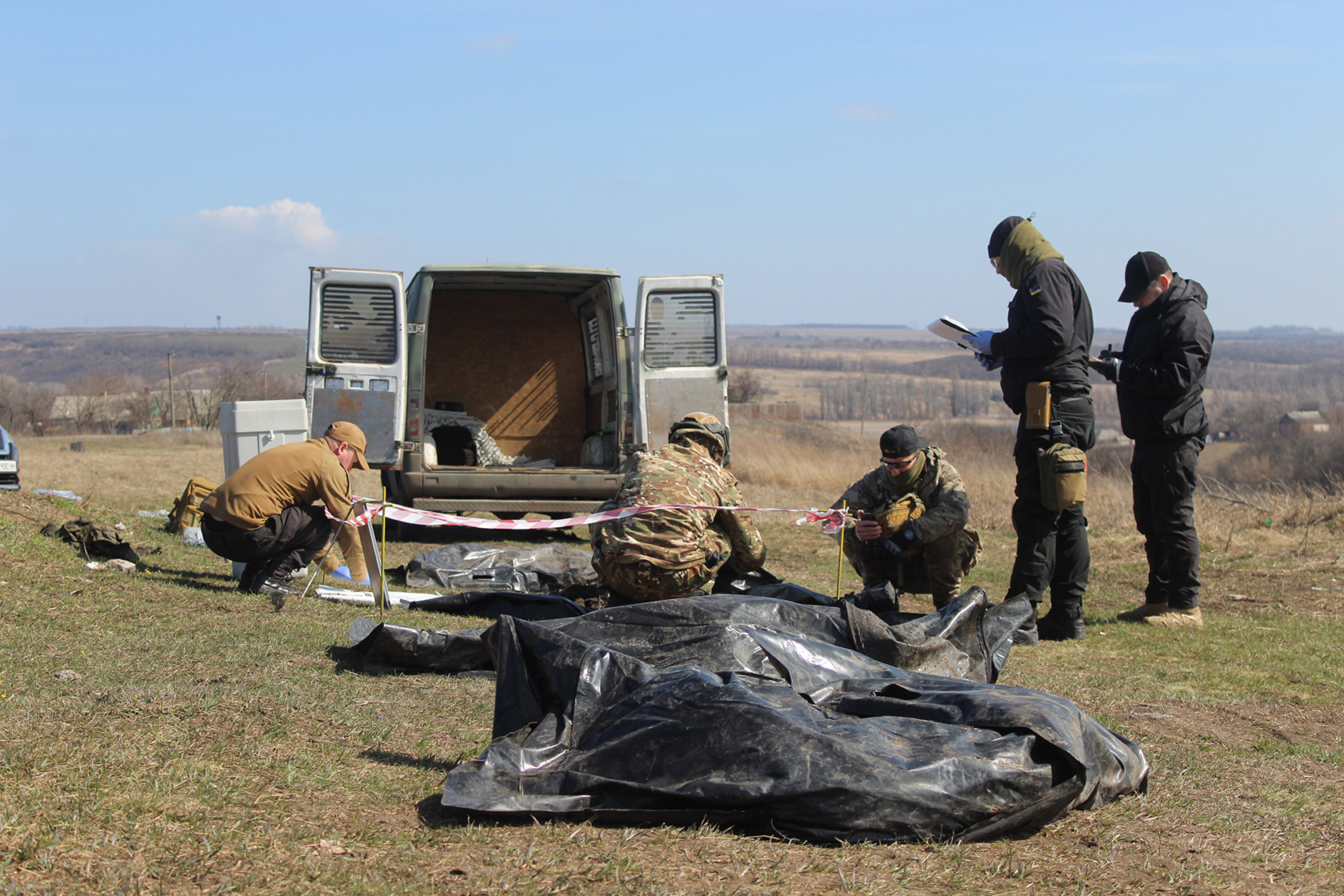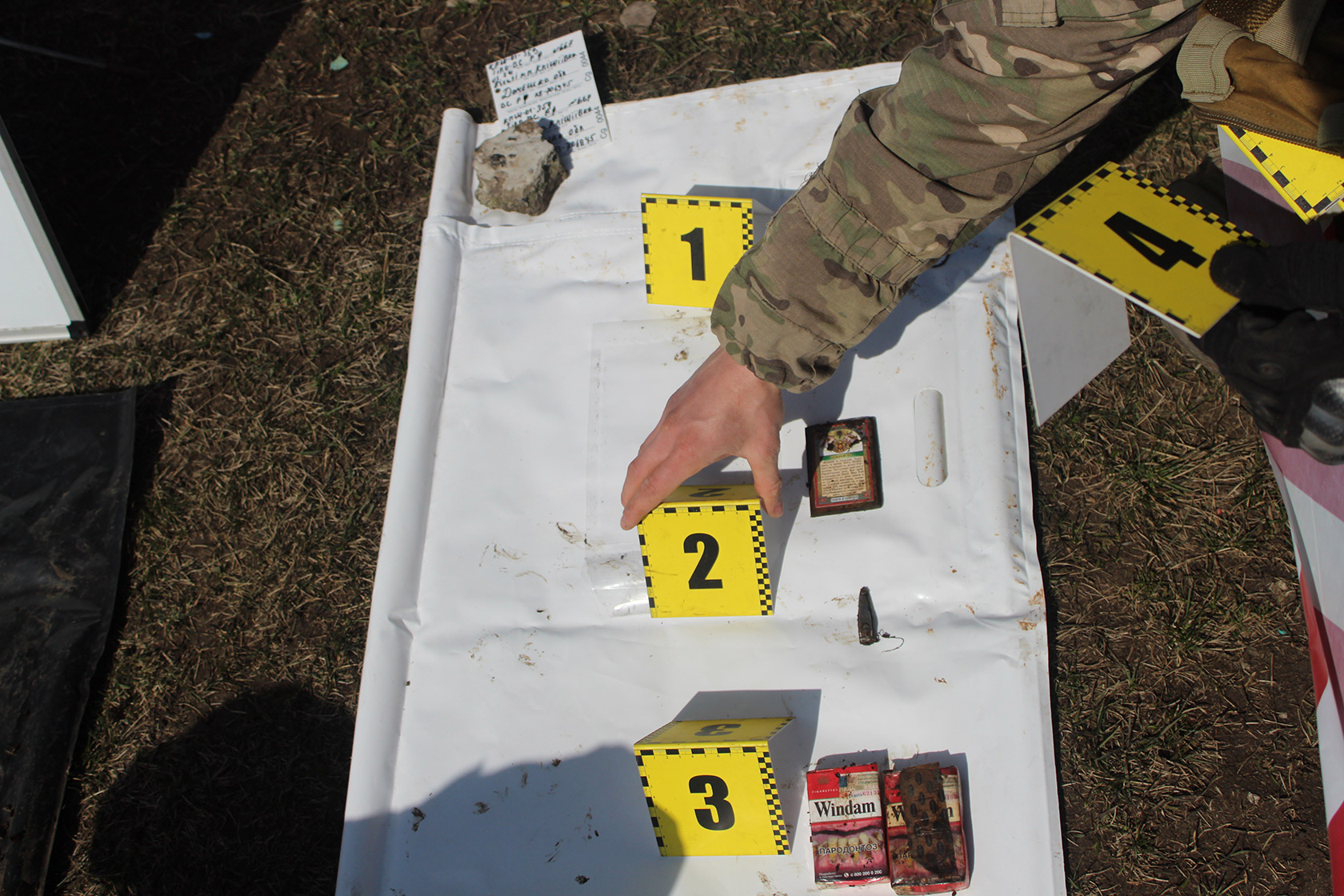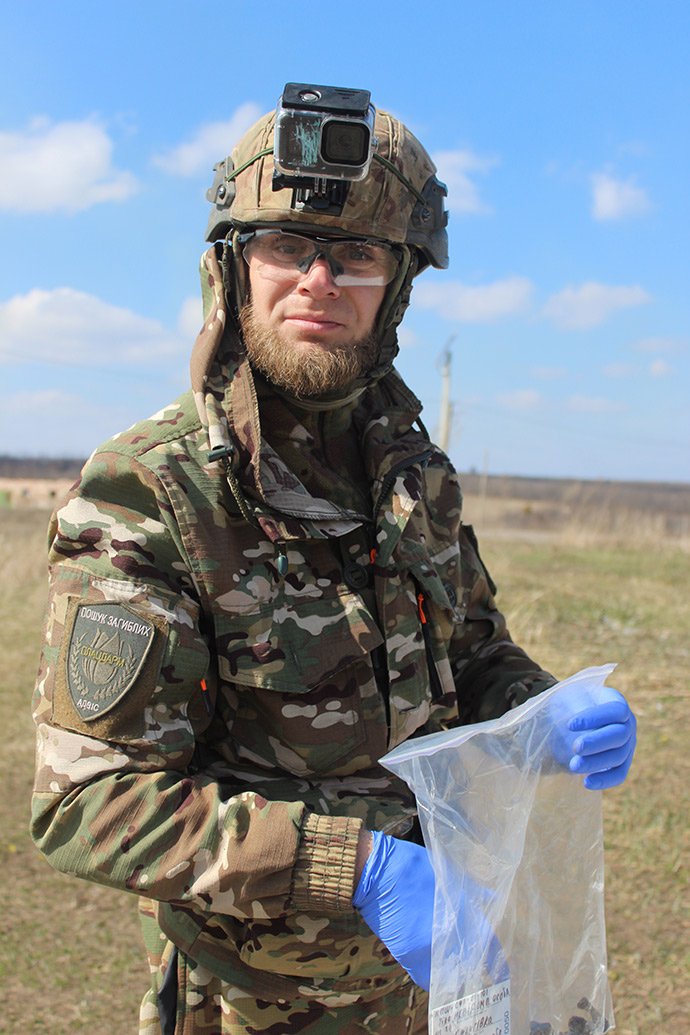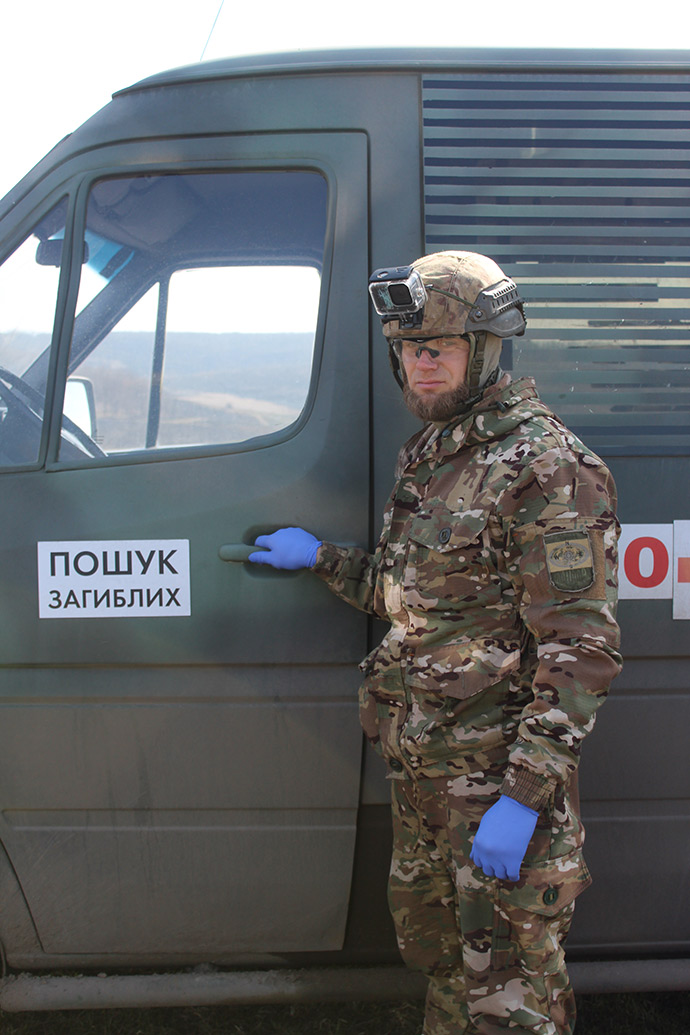Letters from the dead and brushing shoulders with death. Sloviansk volunteer collects soldiers' bodies from the frontline

"Darling, it’s hell here. We were used as cannon fodder. It’s unlikely I’ll make it back home, you better find another boyfriend."
"From here on it’s difficult to make out what he wrote, the paper’s damaged," Oleksii Yukov tries to decipher the writing, but can’t.
He sets the piece of paper down next to a few other things: a small Virgin Mary icon and a red military identity card with a double-headed eagle on the cover. All those things belonged to a Russian soldier who was killed in action.
"So he never got to send the letter?" I ask Yukov.
"He never did. His prediction was right though," he replies.
Yukov and five other men continue to examine the bodies of the fallen soldiers. We’re on a hill in the vicinity of a village in Donetsk Oblast. There’s a strong wind: it carries away from us the stench of human remains laid out on the ground in front of us in black bags. There’s a khaki-green truck that has "Cargo 200" and "On the Shield" written on its doors and sides a little further away. ["Cargo 200" is a military identifier for transportation of dead bodies from the battlefield – ed.]
Platsdarm is a group of volunteers founded by Oleksii Yukov. It counts 10 members who have spent many years searching for the bodies of those killed in this war. During the ATO, Yukov was part of Yaroslav Zhylkin’s Black Tulip group, which recovered many bodies from the hell of the Ilovaisk encirclement. Yukov created Platsdarm as a separate organisation in February 2022. [The Anti-Terrorist Operation, or ATO, is a term used from 2014 to 2018 by the media, the government of Ukraine and the Organization for Security and Co-operation in Europe (OSCE) to identify combat actions in parts of Donetsk and Luhansk oblasts against Russian military forces and pro-Russian separatists – ed.]
Since then, Yukov’s group has recovered more than 1,500 bodies from the front – mostly Ukrainians soldiers, though some Russians too.
"I take every body I find," Yukov says. "For me, it’s not just the body, it’s also their soul."

An inspection of bodies, a standard procedure, is underway. It’s normally carried out by forensic investigators, but Yukov is also authorised to undertake it because of his long-standing work alongside the Armed Forces of Ukraine and the Ukrainian Ministry of Defence.
Yukov calmly opens one of the body bags and takes out and lays on the ground the remains of arms, legs, and bones. He is looking for something that would help him identify the remains. He is wearing large black rubber gloves. There’s not a trace of revulsion in his face: just the calm focus of someone who has been doing this work for a long time.
"There’s a Russian military identification card here, but don’t take pictures," he tells me. "We need those things to exchange them for our dead."
A few days before we meet, Platsdarm volunteers got to positions near the village of Klishchiivka, not far from Bakhmut. They risked their lives to recover the remains of five bodies. It turned out that four of them belonged to Russian soldiers. These bodies are now being inspected and documented before being sent to a morgue; information about them will be sent to the Ministry of Defence of Ukraine, which is responsible for organising exchanges of the dead.
Normally, frontline units would take the bodies away from the front, but that’s not always possible. Constant shelling can make it difficult to reach the place where someone was killed.
The General Staff of the Ukrainian Armed Forces has an office responsible for military-civilian cooperation, which, in turn, has a department of search operations comprising several groups. Those groups do what Yukov does, but all over Ukraine. Meanwhile, Platsdarm’s work focuses on Donetsk Oblast.
It will take a while to find all the dead. According to official data from Ukraine, 31,000 Ukrainian and 180,000 Russian soldiers have been killed since the beginning of the full-scale invasion.

In fact, the true numbers might be different.
In November 2023, Yaroslav Tynchenko, a historian, and Herman Shapovalenko, the head of the Book of Memory of Those Who Died for Ukraine project, published their findings from a research project that used open-source data to estimate the number of Ukrainian soldiers who have been killed in action.
"A total of 454 decrees were issued between 28 February 2022 and 12 October 2023 posthumously awarding 14,402 soldiers, law enforcement officers and other [armed forces] personnel. This is the number of those legally recognised by the Ukrainian state as having died at this stage of the Russian-Ukrainian war.
The Defence Ministry and Olena Verbytska, the Presidential Commissioner for Soldiers’ Rights, said that at the time, 15,000 soldiers were considered missing. "Our experience of working on the issue of soldiers who have gone missing in 2014-2015 sadly suggests that the majority of them have been killed," Tynchenko and Shapovalenko wrote in their report in November 2023.
Letters from the dead
Over the years, Yukov has inspected hundreds of bodies. He says you can find out a lot about a person from their belongings.
He found a folded piece of paper in the passport of one Russian soldier whose body he retrieved. It said: "God bless you, dear son." He also had an icon with him, and a letter to his dad: "Hi dad! How are you? I’m doing great."
Another Russian fighter, from the Wagner Group private military company, had a chevron that had a Rudyard Kipling quote: "This is good hunting". Did this fighter know the full quote? "This is good hunting, and – my last." Those were Akela’s words.

Another eerie item that Yukov sometimes finds among remains are watches: their hands continue moving even though the owner of the watch is dead.
Yukov has been searching for dead bodies for over 20 years. When he was a teenager, he joined his family on a search mission for soldiers killed in World War II. He took the mission’s importance to heart.
Yukov is an athlete, a professional Thai boxer. He started a boxing centre in his native Sloviansk and eventually headed the local Thai boxing federation. Everyone in Platsdarm is from Donetsk Oblast.
He retrieved the bodies of the first victims of the Russian war against Ukraine from the outskirts of Sloviansk back in May 2014. His city became the epicentre of fighting between the Ukrainian Armed Forces and the terrorists headed by Igor Girkin who had captured Sloviansk.
At the time, Yukov managed not only to recover the bodies of fallen soldiers, but also to facilitate exchanges between the two sides. Even people in the separatist forces knew he was a local, though not all of them: Yukov nearly lost his life while searching for the bodies of others.
Between life and death
Yukov was on his way home on a sunny day in June 2014. A car pulled up in front of him and several armed men stepped out.
"That’s him, that’s definitely him! Grab him!" one of the men shouted.
Yukov was tied up and taken to the Security Service of Ukraine (SSU) building in Sloviansk, which was at the time controlled by fighters from the self-proclaimed and Russian-backed Donetsk People’s Republic. They read him his execution order, citing Stalin’s decree from World War II.
Yukov found this historic reference so absurd he started laughing.
"Guys, what are you talking about, this is a decree from 1941! Have you lost your minds?" he asked, still laughing. He received several blows to his stomach for an answer.
He was taken outside, where he was supposed to be shot to death. Suddenly, the Ukrainian Armed Forces started shelling the area, and the militants hid in trenches they had dug around the SSU building.
Yukov was searched by the militants. They found his phone and called the last number he had dialled – it was another separatist militant, someone Yukov agreed an exchange of bodies with.
"Hey, we found an Ukrop here, he was spying. We’re about to kill him!" [Ukrop, Russian for "dill", is a derogatory term some Russians use to designate people from Ukraine, supposedly for the widespread use of dill in Ukrainian cooking – ed.]
The separatist on the other side of the phone responded in a way that the militants who detained Yukov weren’t expecting.
"Who the f**k have you captured, motherf***ers! He’s a search worker! When your bodies are lying here, he’s the only person who won’t just step over them but get them out of here. Don’t you dare touch him, you idiots!"
"But we got an order from First!" the militants protested.
Yukov waited for 20 minutes, unsure whether he’d be let go or executed. Eventually his captors got a call from Girkin himself.
"The execution order has been revoked. Let him go," he ordered.
Yukov heard every one of his captors’ words, and remembers them to this day.

After this incident, Yukov found himself on the brink of death several more times.
During ATO, his vehicle was caught in enemy fire, despite the fact that Yukov agreed on safe passage for his search team with the militants’ leaders just the day before.
Shells were hitting close to his vehicle. When he and his team miraculously managed to escape unscathed, an angry Yukov called the leader he made the agreement with.
"What’s all the fuss about? This is war, the guys just wanted to shoot a little!" the separatist leader told him.
In September 2022, Yukov sustained a heavy injury when a mine detonated while he was searching for bodies in the recently liberated Kharkiv Oblast. His group was searching a forest. Yukov was walking slowly and was able to jump aside when he heard a familiar sound: the click of the MON-50 anti-personnel mine. That jump saved his life, taking him slightly further away from the epicentre of the explosion. Shrapnel sent scattering over 40 metres injured Yukov’s legs and face.
His friends quickly administered first aid and took him to a hospital. The wounds on his legs were not critical, but he lost his eye and now wears a prosthesis.
There have been more grievous incidents during Platsdarm’s search missions. In January 2023, a Platsdarm vehicle drove over a mine. One of the team members, 21-year-old Denys Sosnenko, died on the spot.
"Souls of the dead trust us"
The Platsdarm group has two arms: one is responsible for searching for the bodies on the front, the other examines and documents them and takes them to morgues. This takes time – and money. Platsdarm exists thanks to donations.
"Sometimes we end up 100-200 metres away from enemy positions," Yukov says. "Or even on the occupied territory."
Working in such proximity to death is emotionally challenging, and has left its mark on Yukov’s worldview.
"I’m more of a pagan," he says. "Until the body is buried, the soul is attached to it. The body has to be brought home so that the soul can be reborn."
Yukov, the ferryman of the Ukrainian underworld, has had several mystic experiences. Sometimes his group spends a long time searching for one particular body – and then he sees it in his dream.
"I feel as though someone’s talking to me in my dream, and then I find the body. Souls of the dead trust us," he thinks.

He gets requests to find bodies from both sides of the frontline.
"The dead are on my side, and I will always be on theirs," he says. "No one else will stand up for them now."
Two hours later, the inspection is complete. The black body bags are carried to the truck. Yukov and his volunteers pack up their documents and other belongings and get ready for their next mission. The search must go on.
"We need this, those who are still here," he believes. "So that everyone remembers who gave their lives for our freedom."
Vladyslav Holovin for Ukrainska Pravda
Translation: Olya Loza
Editing: Judith Edelman